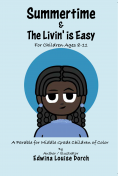
LitPick Review

In Summertime and the Livin’ is Easy by Edwina Dorch, we meet Jasmine, a 10-year-old, bright, spunky Black-American child and her 11-year-old brother, Frankie. We are led to surmise that they are growing up in the American South, perhaps sometime in the 40’s or 50’s. Her mother works as a housekeeper for a Caucasian family and Jasmine sees the stark contrast between her family and the family of her mother’s employer. This brings Jasmine to question the fairness of life. Being brought up in a household of faith, this inequality, and the poverty she sees around her at her own home brings Jasmine to question if there is a God. How can there be a God if he allows some people to be so rich and live in luxury while her family is so poor. Furthermore, if there is a God, how can he allow Jasmine’s cruel stepfather to be so mean to she and her brother. One day, their cruel and controlling stepfather decides to send Jasmine and Frankie out on a simple errand to buy bread. This simple trip however leads the two children to unexpected adventures and risks as they explore the world around them and challenge each other with questions about nature, life, and ultimately faith. Eventually, Jasmine’s impulsiveness during their trip leads to trouble and praying to God seems the only way to hope for help. Will God help Jasmine and restore her faith by giving her a deeper understanding of His view of the world?
Opinion:
Summertime and the Livin’ is Easy is a powerful story filled with imagery and meaning hidden among its simplicity. On the surface, we see the white master and black servant or housekeeper setting up a young girl’s doubts about her faith and the existence of God. The author presents this contrast early in the story and then compounds Jasmine’s doubts about God when we follow her home and see the cruel behavior of her stepfather. The author helps us see that life cannot just be unfair in its opportunities to achieve financial security but can be a very difficult place to live too because of dysfunctional people, particularly in families.
Losing her faith in God, Jasmine symbolically tears a necklace with a cross off her neck and throws it to the kitchen floor. This highlights her break with her faith. The author then skillfully rebuilds Jasmine’s faith along her journey with her brother to buy bread for the family. Discussions and questions arise about the world around them and God which challenge Jasmine’s belief in things which she cannot see like ghosts living in a haunted house or snakes with flash bulb eyes she has never seen but firmly respects and heeds. These questions metaphorically relate to her question about the existence of God. Jasmine also ventures over a train track which goes on forever without an end in sight, like how life must look to her at the age of 10. She then casts off an old wheel on to this seemingly endless track of life, symbolically trying to break free from her life trapped in a cycle of poverty. But her thoughtless, impulsiveness compounds her problems and interrupts her trip to the store just as thoughtless and impulsive acts can derail our paths in life. Feeling completely helpless and lost at this point in her journey with her brother, Jasmine instinctively turns to God for help. She and her brother weather a series of other misadventures before finally returning home to face the wrath of their stepfather for not buying bread for their family as he told them.
Once at home though, Jasmine miraculously discovers something which reaffirms her faith in God. At this point in the story, her brother reattaches her necklace around her neck, and we feel Jasmine’s reconnection with her faith. Through Jasmine’s renewed understanding of God and her new view of the world around her, the author beautifully points out that inequalities and challenges exist for everyone but as individuals we must keep our faith and live our lives truthfully, honorably, and proudly. The story implores us to always strive to be better because God has given us the opportunities to achieve but it is up to us to choose the right path. We also cannot rely on Him to make the “going get easy” in the summertime or at any time in life, instead He challenges us with shaping our own happiness and future.
The power behind this story lies in its relatability to the way other people have also been confronted by inequality and tragedy which has led them to question God’s existence, like during times of slavery and the horrors of the Holocaust. There are so many good questions about faith, belief, and life in this story that I therefore feel these will be best examined by preteens and teens under the guidance of an insightful and thoughtful adult.


